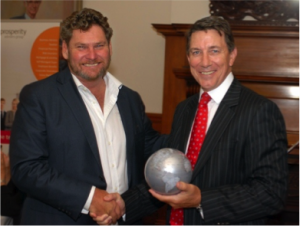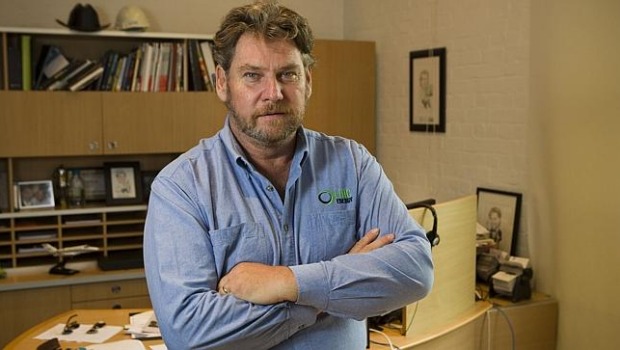Peter Bond, Billionaire Entrepreneur and CEO of Linc Energy joined us last month for Prosperity Advisers’ Business Leaders Dinner.
The dinner was part of an occasional series to showcase the stories of those that have reached the top of their field in business. Previous speakers have included Gail Kelly and Chris Cuffe.
Peter’s return to Newcastle and to Prosperity was a blast from the past for him, a man who in 1984, at 23 years old started his career in coal in Lake
Macquarie with ‘$500 bucks and a ute’, and by 26 had made millions. Fast forward 28 years and today he is the worldwide leader of a billion dollar
public company “but still at the beginning of the biggest journey” he says.
His is so much more than a local boy made good story. At Prosperity we had the pleasure of working with Peter in Newcastle and then in Linc’s formative years through our Brisbane office. Peter’s lessons are real, raw and honest.
He shared with us on the night the seven things that made his journey from small business to global company possible. They are poignant lessons for all those growing a business, particularly those facing tough economic headwinds. So I want to share them with everyone we work closely with so you too can benefit.

Prosperity CEO, Allan McKeown congratulates Peter Bond (left) on his impressive local to global journey.
1. Vision: Know what you want
Peter Bond has one thing that many business owners don’t… an impressive, passionate and unerring vision for the business he wants to create. And he is proud to admit it.
“As a business owner you need to pursue your vision fearlessly” he said, “You’re the CEO, if you aren’t passionate about it, who is?”
And Peter’s passion extends much further than building a successful business. In fact Peter is committed to providing the world with an environmentally friendly or ‘clean’ process for converting coal into oil that will change our capacity to produce energy in many countries throughout the world. “Every country in the world that is long coal and short oil can change it’s energy futures right now,” he said. This is his vision, and given his impressive track record to date, I have no doubt that he can deliver on his promise.
2. The People: Get the best – It may take a few years, but keep striving
As your business grows he was emphatic that you need different people in different roles, roles that suit the business’ growth requirements.
“The people who were with you in the first five years are probably not the same people who will be with you in the next five, or the next. You need different skills as your business grows, and fresh people around you to challenge your team and take the business where it needs to go”.
“The people who were with you in the first five years are probably not the same people who will be with you in the next five, or the next."
3. The Trend – Macro economics matter
As a business owner, you must understand the macro economic trends your business is built on better than anyone else. “You must understand the price points that make your business successful and the trends that underpin your ‘industry’s growth’. I was looking at the oil price back in 2004 when it was just $27 per barrel and with a well researched understanding, it was obvious oil was headed higher, much higher. It is this trend that provides the foundation for Linc.
Peter shared at length his insights into the enormous shift of Asian population into the middle class that is changing the way our world uses energy, driving the commodity cycle and supporting oil prices at $100 or more for the longer term. “This trend is not going away,” he said.
“And, we know that there are some heavy weights holding the oil price up, chiefly those massive oil producing nations who have low direct oil cost, but high costs of sovereign operations. Whilst their oil production cost can be as low as $10-12 per barrel, their government operations cost a lot more, putting the effective oil price at between $80-$95 a barrel to keep them funded. Whilst you could never prove it, whenever the oil price slips a little, the taps appear to slow down, restricting supply until demand catches up.
“It is these very trends that are likely to keep oil above $80/barrel and pushing over $100/barrel for the foreseeable future,” he said.
“But, these sort of trends are everywhere, and knowing how your business fits into them is critical to your strategic planning and positioning of your business”.
4. The Systems and Procedures: Lay the Foundation
Linc Energy takes their systems and processes very seriously. “In a public company, the systems and procedures that you put in place are the foundation of your growth. At Linc we have been very focused on proving our systems, processes and procedures for creating a clean energy business. It is these robust systems that enable us to grow the way we have and take the company worldwide”, he said.
5. Funding and Execution: How you’ll implement your vision
It is also imperative to know how you are going to fund the growth envisaged in your business plan. “I wrote a business plan for Linc when it was worth $1 million that planned for the entry of public funding. It needed it to succeed. We needed to bring in investors to give us the scale to expand worldwide and execute on the opportunities in front of us,” he said.
“We know we were there at the right time, in the right place and had the right vision for investors. We found that financiers in London and New York wanted to back winners. So it was critical to demonstrate to these investors that Linc was a company that knew how to execute on the vision and deliver returns.”
6. Sales and Marketing – Lead from the Front
Don’t underestimate the power of good sales and marketing.
“I am lucky, I have never had to call someone and sell our oil, because being a tradable commodity, oil pretty much sells itself. But I have had to spend my whole career selling our business, attracting and educating investors, creating a great work culture; and ensuring the right PR messages get out. Sure I have made a few errors along the way, the biggest of which was stepping away from the frontline for a while at the wrong time. As CEO I recognize how critical sales, marketing and PR/IR are to our success.”
7. Risk and Reward: 5X is the minimum
Peter Bond was adamant that he now does very little that has the potential to achieve less than a 5X return. Whilst to many of us that seems surreal, his explanation was direct and enthusiastic. “At 15 to 20% returns I am not an entrepreneur, I am a business manager, and that’s not what I am,” he said.
“We’re always pushing in this business, risk and reward go together. If you go too conservative you actually raise your risk. If you over analyse M&A deals you can always find a reason not to do them. But we have got to a good place. We need to know the deal ticks all the boxes so the facts enable us to do the deal, but the macro completion of a deal will keep pushing and meeting our vision to keep leading our industry in clean energy. We are focused on keeping ourselves at the forefront of what we do.”
While this is a very brief overview of Peter’s extensive presentation there are take home messages we can all learn from and apply to our businesses. Whether you run a development company, a mining operation, a manufacturing business or a services firm, you can apply them to your scale of operation and adapt them for success.
From ‘500 bucks and a ute’ Peter’s business interests now span 400 global coal, oil and clean energy assets stretching from Uzbekistan, Alaska, across the US and Australia with more to come.
His story is a truly inspiring one.



